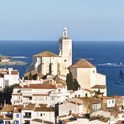We went to Seville for semana santa. I was filming the first segment of a Channel Four series about gods and remembered the fervently pious parades of the early 1960s. We were living in Fuengirola when it was a dusty little village with 600 inhabitants (today, during the summer, it has a quarter of a million). Semana santa in Malaga was an intimidating celebration. The tronos on which the images of the Virgin and of Jesus were lurchingly carried by their unseen crews were preceded by the moustachioed guardia civil, carrying reversed arms; they might have been at a king's funeral. Drums beat as if for an auto-da-f?. The hooded celebrants were black with menace and even the flagellants-an elite troop scourging blood from their own backs-seemed to be establishing a capacity for ruthlessness which they might soon visit on others. Franco's authority was dyarchic with that of the church.
The resurrection was also a vindication of tyranny; "Arriba Espa?a" was, after all, the trademark of the Falange. "Viva la muerte" had been the macabre slogan which so scandalised Unamuno when the old philosopher realised what a vile fraternity he had, until then, endorsed. Even today, in Malaga, the right-wing pietists sing an anthem which proclaims them the "novios de la muerte." It seems (and I have to hope) that there will never be a single spiritual currency in Europe.
u u u
we lived well, on ?10 a week, in fascist Spain. If we felt a certain defiant shame in being there at all, the old insular vanities-we observe the follies of others, but do not participate in them-kept us insolently aloof. Our black-clad, widowed maid, Salvadora (Ptas 300 a month, and all the food she could tote home), rejoiced that Franco had brought "tranquilidad"; if we knew better, we did not insist on educating her. The then revered Jean-Paul Sartre may have said of Franco that he had the "grosse gueule d'un salaud Latin," but fundador was Ptas 15 a litre and our children played on empty playas. The myth of Bohemia was still intact; like Lawrence and Hemingway (who had recently fought a journalistic mano-a-mano with an aficionado called Kenneth Tynan), young writers slid off to observe the ageless rituals of the Mediterranean and sentimentalised the dirt that spawned them.
For me, Seville comes third among the cities of El-Andalus. In the Alhambra, Granada has the grandest monument of the Arab conquest; Cordoba sports the amazing Mezqu?-ta. Seville is the city where the Inquisition lit its most implacable fires. Christianity came later than the Jews, but evicted them with greedy contumely. The heart of the old Jewish quarter-now the Barrio Santa Cruz-is the busy, touristic Plaza Do?a Elvira, named after a rich beneficiary of the evictions. Running into it is an alley named for a Jewess who, allegedly, tried to mount a futile counter-coup. Sinona's "treachery" lent opportune vigour to Christian self-righteousness, just as the murder of von Rath the (anti-Nazi) second secretary in Paris by a young Jew, Herschel Grynzpan, "justified" the Kristallnacht pogrom of 1938.
u u u
seville, this easter, had little menace. Although the parades were almost endless, the guardia now wear more genial faces and carried no obvious weapons. However, our friend Harry Gordon, who has lived in Spain ever since we met, in the autumn of 1959, is an ex-Catholic (or is one never ex, only lapsed?) and still finds the Malaga parades almost unbearable. He tells me that the tronos used to be so heavy that the authorities had to go down to the harbour and bribe estivadores to carry them. The hired hands sometimes got so drunk that they would tilt the holy images into the ditch.
u u u
one of seville's great totemic figures-unacknowledged in the days of piety-is Don Juan, who is a kind of anti-saviour: while Jesus, Julius Caesar, who stands in the Alameda gardens and Herakles, the mythical founder of the city, were, mutatis mutandis, summoned upwards, Don Juan was immortalised downwards, so to say, by a father figure far from well pleased with him.
Seville's amiable crowds, whose modern women promise that Franco has not escaped the death his followers vaunted, may cross themselves in the traditional way, after touching the effusive silvered tronos, but they do not manifestly burn with zeal. It is a comfort to believe that their enthusiasm is more folkloric than ideological; I should not care to live in a society without a working majority of hypocrites. As for Franco, he has no visible memorial at all (even in his home town, in Galicia, anyone photographing his equestrian statue is hissed by the citizens).
The American bases, too, have gone. In the 1960s the biggest was at a place called Moron; American licence plates all bore the legend "US Army Moron." In Seville, the utterly abandoned site is commemorated, on the way to the airport, by the improbably named Avenida Kansas City. There is a busy McDonalds though. ¡Lastima!












